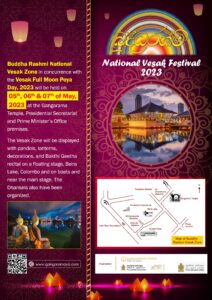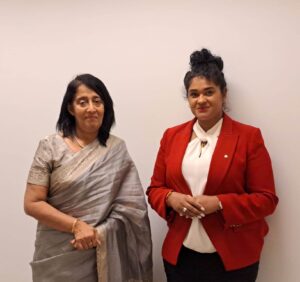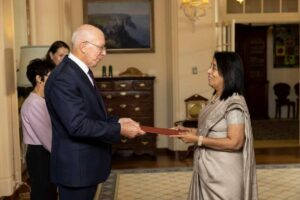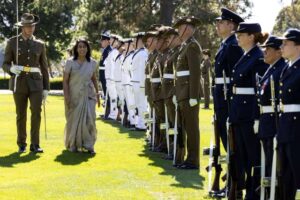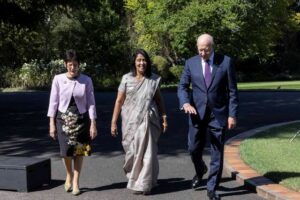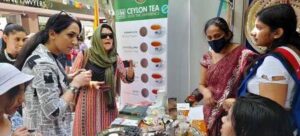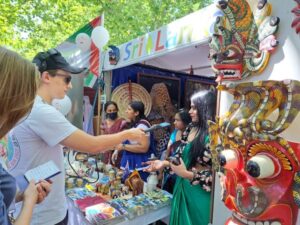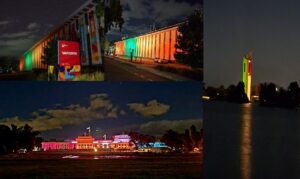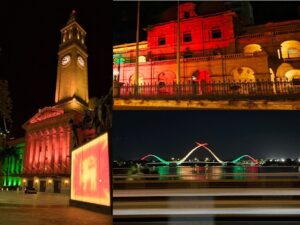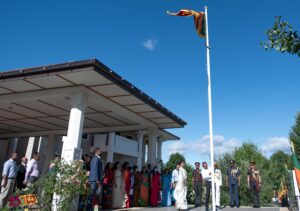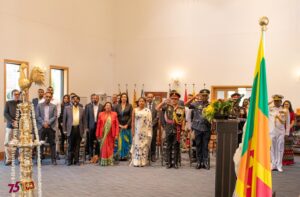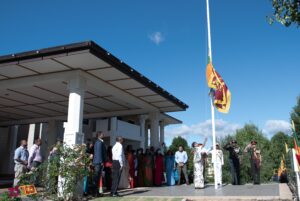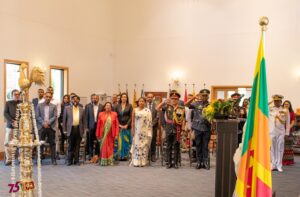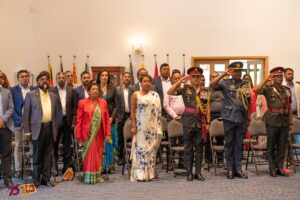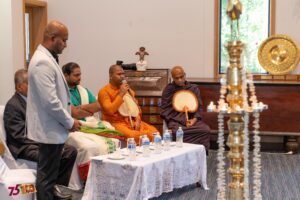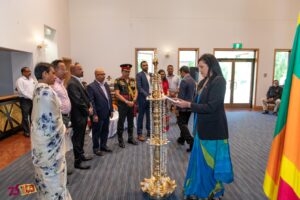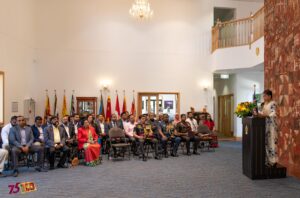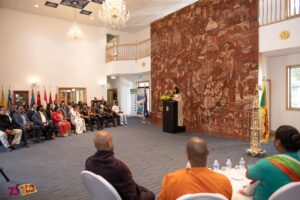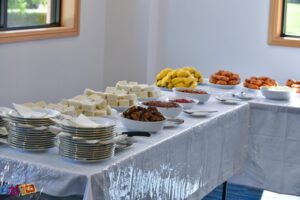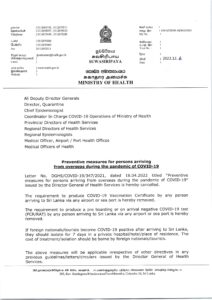


The Easter Message by H.E Ranil Wickremesinghe, President of Sri Lanka
April 10, 2023
Please read in Sinhala,Tamil and English in PDF….
Easter Sunday celebrates the ability of Lord Jesus Christ, as the Son of God, to transform lives by dispelling darkness in people’s minds and bringing hope to the world.
With Easter commemorating the resurrection of Jesus, it is an occasion for us to reflect on the values of love, peace, and forgiveness as espoused by Him, which are at the core of Sri Lankan culture, and we must come together with family, friends and communities, to solemnize the blessings life has to offer. Read More »
New Sri Lankan Envoy meets with Australian Parliamentarian of Sri Lankan Origin
April 4, 2023
Sri Lanka High Commissioner to Australia Chitranganee Wagiswara called on Federal Parliamentarian, Ms. Cassandra Fernando.
The High Commissioner congratulated Ms. Cassandra Fernando, MP on being elected to the Federal Parliament last year and stated that Sri Lanka is happy and proud to have an Australian of Sri Lankan origin in the Australian Parliament.
High Commissioner Wagiswara and Ms.Cassandra Fernando discussed the present political and economic developments in Sri Lanka and exchanged views on Australia Sri Lanka relations. They agreed to explore opportunities to enhance links between the two countries.
The High Commissioner was accompanied by Ms. Chamari Rodrigo, Deputy High Commissioner.
High Commission of Sri Lanka in Canberra
Australia
04th April 2023
Presentation of Letters of Credence – Australia
March 21, 2023
The High Commissioner to the Commonwealth of Australia, Chitranganee Wagiswara presented her Letters of Credence to the Governor General AC DSC (Retd.) David Hurley on 16 March 2023 at the Government House, Canberra.
The formal ceremony included a guard of honour and a luncheon hosted by the Governor General to the three High Commissioners/Ambassadors who presented credential on that day.
The High Commissioner had a separate audience with the Governor General joined by the First Assistant Secretary of the Department of Foreign Affairs & Trade of Australia and the Senior Representative of the Government House.
During the discussion the High Commissioner conveyed the greetings of the Sri Lanka President, Ranil Wicremesinghe to the Governor General. While expressing his good wishes to the Sri Lanka President, he congratulated the High Commissioner on her appointment and conveyed his best wishes for a successful tenure in Australia.
The High Commissioner spoke briefly on the political, economic and social developments in Sri Lanka and the challenges and priorities of the government. In this context, the High Commissioner thanked the Australian Government for the assistance granted to Sri Lanka in the form of medicine and food to tide over the difficult period last year.
It was noted that Sri Lanka and Australia have maintained close and cordial bilateral ties over the years and both sides were of the view that the friendship and cooperation that exists between the two counties could achieve greater heights in the years to come.
The High Commissioner was accompanied by Deputy High Commissioner Chamari Rodrigo, Minister U.G.C Abeyrathna, and Counsellor (Defence) Capt. Sanjeewa Kathriarachchi.
High Commission of Sri Lanka
Canberra
20 March 2023
Sri Lanka showcased as “Asia’s Best Wildlife & Adventure Tourism Destination” at Canberra Multicultural Festival 2023
March 8, 2023
Sri Lanka High Commission in Canberra participated in the “Annual Multicultural Festival 2023” in Canberra organised by the ACT government, as part of Mission’s tourism promotion activities.
The Multicultural Festival which is Canberra’s iconic and much loved annual event at the heart of the city was held after a three-year hiatus due to the Covid pandemic.
The Sri Lanka stall which was decorated with colourful traditional masks, tourism promotion posters, Ceylon tea banners etc. was arranged to promote Sri Lanka Tourism and Ceylon tea.The theme of the Sri Lanka stall at the festival was “Sri Lanka – Asia’s Best Wildlife & Adventure Tourism Destination ” showcasing it’s biodiversity hotspots, fascinating wildlife safaris, whale watching, exotic birds etc. Tourism promotion brochures and leaflets were handed out to the visitors to the stall which included members of the media.
A “Ceylon tea tasting” was also held to promote Ceylon black tea and green tea among Australians. The tea tasting event attracted many visitors with the green tea tasting being the most popular given the increasing demand of Australians for sustainable, nutrient rich healthy food / drink.
The three-day festival visited by around 350,000 people included a spectacular entertainment programme and hundreds of stalls showcasing cuisines and cultures from all over the world.
The festival has been a part of Canberra’s vibrant street life culture for over three decades.
High Commission of Sri Lanka
Canberra
07 March 2023
Australia – Sri Lanka Parliamentary Friendship Group to be re-launched
February 27, 2023
 |
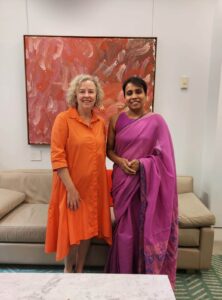 |
Acting High Commissioner Chamari Rodrigo paid a courtesy call on the Speaker of the House of Representatives Milton Dick at the Federal Parliament recently. While thanking the Australian government for their invaluable assistance to Sri Lanka to meet urgent food and healthcare needs, the Actg. High Commissioner apprised the Speaker on the progress made and the steps being taken by the government to address the economic challenges in the country.
The particular focus of discussion was the proposed re-launching of Australia – Sri Lanka Parliamentary Friendship Group (ASPFG). The Speaker who was a member of the previous Australia – Sri Lanka Parliamentary Friendship Group (ASPFG) supported this idea which would enhance relations between Sri Lanka and the Australian Parliament and was keen to have the re-launching event in the Federal Parliament.
Following the meeting with the Speaker, the Actg. High Commissioner paid a separate call on the Deputy Speaker of Australian Parliament Sharon Claydon, Labour MP who became the third woman to occupy the role of Deputy Speaker of the Australian Parliament. The proposed re-launching event of the Friendship Group was also discussed in detail with the Deputy Speaker who encouraged for more female representation in the new friendship group.
The new friends of Sri Lanka Group consist of 45 MPs from the Labour and Liberal Party of the Australian Federal Parliament which includes Deputy Speaker Claydon. The new Chairperson of the group is a Sri Lankan origin Labour MP from Victoria Cassandra Fernando and the Vice-Chair is Senator Wendy Askew, Liberal MP from Tasmania.
The re-launching of the Friendship Group is scheduled during the next Parliamentary sittings in Canberra. Sri Lanka High Commission Canberra 24 February 2023.
Sri Lanka High Commission
Canberra
24 February 2023
Iconic Australian National Monuments illuminated for Sri Lanka
February 23, 2023
The Sri Lanka High Commission, in partnership with the Australian government arranged for the illumination of iconic Australian National monuments in the colours of the Sri Lankan national flag to mark the 75th Anniversary of Sri Lanka’s Independence and 75 years of diplomatic relations between Australia and Sri Lanka.
From 03-06 February 2023, twelve (12) national monuments from Canberra (The Royal Australian Mint, Old Parliament, and Carillion); Melbourne (Flinders Street Railway Station); Queensland (Parliament, City Hall) and; Perth (Council House and five bridges) were lit up in the colours of the Sri Lankan flag to mark this historic milestone.
The illumination of the iconic monuments symbolizes the longstanding and mutually rewarding friendship between Australia and Sri Lanka.
On 04 February the High Commission commemorated the 75th anniversary of independence at the Sri Lanka High Commission premises with the participation of representatives of Sri Lankan community in Canberra and the officials of the Sri Lanka Triforces who are presently undergoing training in Australia. The celebration commenced with the flag hoisting ceremony followed by singing the national anthem in the Sinhala and Tamil languages and conducting multi-faith observances.
Speaking at the occasion, Acting High Commissioner Chamari Rodrigo said Sri Lanka marked the historic milestone of the country in the midst of a myriad of challenges on the economic front. She appealed that, even though the economic situation does not warrant a grand celebration, it is clearly a time to reflect on the post- independence years; rectify our failures and for the citizens to rededicate themselves to ensuring their country’s well-being for the future.
The Acting High Commissioner also highlighted the enduring bilateral partnership between Australia and Sri Lanka which rests on the strong foundation of people-to-people connectivity and shared values. “The illumination of so many monuments together in the Sri Lankan flag colours, for the first time in Australia, signified 75 years of mutually respectful partnership with Australia which is home to a large Sri Lankan expatriate community. The Sri Lanka High Commission extends its sincere appreciation to Australia for its warm gesture”, she added.
The SriLankan Airlines and the Australia – Sri Lanka Association in Canberra (ASLA) supported the illumination project by encouraging the Sri Lankan community to capture the unique moment through photos and videos. SriLankan Airlines sponsored a return air ticket to Sri Lanka for the winner of the best photo.
The Sri Lanka High Commission in Canberra considers the lighting up of iconic monuments in Australia in the colours of the Sri Lankan flag as momentous and historic.
High Commission of Sri Lanka
Canberra
21 February 2023
Commemoration of the 75th Anniversary of Sri Lanka’s Independence at Sri Lanka High Commission in Canberra
February 15, 2023
Digitalization of Arrival and Departure Facilities
January 30, 2023
Facilities have been provided to complete the Arrival cards by foreigners coming to Sri Lanka and Departure cards by Sri Lankans leaving the country through online with effect from 01.01.2023.
Accordingly the ari passengers have been facilitated to fill this card online three days prior to their travel, visiting the official website: www.immigration.gov.lk of the Department of Immigration and Emigration or through the link: https://eservices.immigration.gov.lk web page. Thereby it enable the passengers to complete the immigration and emigration formalities without any inconvenience.
Please visit : https://eservices.immigration.gov.lk/emb/eEmbarkation
The Controller-General, Department of Immigration and Emigration
Preventive measures for persons arriving from overseas during the pandemic of COVID-l9
December 12, 2022
Register with the High Commission
The Sri Lankan High Commission in Canberra would like to keep in touch with Sri Lankans and persons of Sri Lankan origin living in Australia, New Zealand, Fiji, Papua New Guinea, Vanuatu and other Pacific Islands as well as Sri Lankan community organisations in those countries.
If you are a current/former Sri Lankan or an office bearer of a Sri Lankan community organisation we invite you to register with the High Commission.
RegisterAddress
Sri Lanka High Commission
61, Hampton Circuit
Yarralumla
ACT 2600

